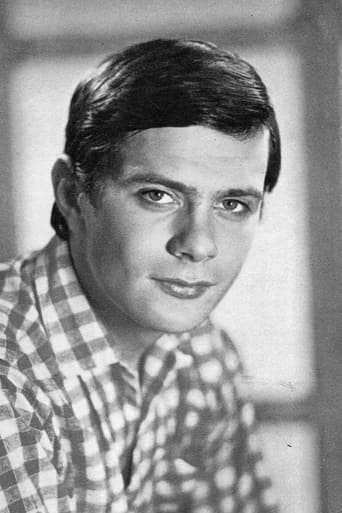AutCuddly
Great movie! If you want to be entertained and have a few good laughs, see this movie. The music is also very good,
Neive Bellamy
Excellent and certainly provocative... If nothing else, the film is a real conversation starter.
Abegail Noëlle
While it is a pity that the story wasn't told with more visual finesse, this is trivial compared to our real-world problems. It takes a good movie to put that into perspective.
Allissa
.Like the great film, it's made with a great deal of visible affection both in front of and behind the camera.
dy158
It is a part of Inner Mongolia which seemed to be cut out from the outside world. But the city-bred Pagma is trying to resist the advances of her husband Gombo out on the plains. It would turn out that the married couple has three children, while Chinese law (which Inner Mongolia is part of China) limits Mongolian families to two children.There are also signs of modern influences in the hut the family lives in, even if Gombo raises sheep, cattle and horses, leading the live of a typical Mongolian nomad. A generator for electric light in the hut, Gombo's son wearing a baseball cap, his daughter who plays an accordion which was given to her by an uncle who lives in the city, the neighbour who seems to be drunk most of the time whenever Gombo and Pagma sees him who gives them a movie poster and swearing that it looks like his brother in America which actually shows Sylvester Stallone in Rambo.Gombo's seemingly normal life would be disrupted when he rescued Sergei, a Russian construction worker building the transcontinental road in Mogolia where his truck went to the edge of a lake. After initial awkward exchanges which happened at the hut when Sergei initially wondered what to do with the sheep which Gombo had killed and skinned, the two men from very different backgrounds began to feel at ease with each other.But there is also Pagma who had told Gombo to go to the city to get a television set and some condoms, other than Sergei wondering why he has to work outside of Russia while trying to get to grips with the demise of the Russian soul at a nightclub in the city with a fellow compatriot, which came at a time when the Soviet Union has already collapsed. Even with the unlikely friendship, there is the constant juxtaposition of what the intrusions of the modern age has in store for the two men who wants to cling on to their respective identities.It is not a film to understand easily on the surface as it forces to look at one's own identity as it connects with the world around him/her, but there are also the comic elements in the film like in the form of the drunken neighbour of Gombo and Pagma to provide the comic relief.For those who may be unaware of the various references shown and mentioned throughout the film, it can seem confusing at times, even towards the ending. But it is a reminder of how there are times when one wants to move forward with the times, there always seemed to be something holding one back reminding one's own identity in the first place.
billcr12
The Russians are not usually known for their sense of humor, but Urga proves that there is always an exception to the rule. A man living in a yurt with his wife and three children wishes to continue a sex life with his wife, but she does not want any more kids. A Russian truck driver, Sergei is driving through a field and ends up with the front wheels stuck at the edge of a lake. He finds the yurt and he and Gombo become friends despite a communication problem. They travel to a city to buy condoms, but Gombo gets side tracked and brings home a TV set and other goodies instead. He has a dream in which Genghis Khan is married to his wife and the conquerer kills him and Sergei and destroys the television, all while riding a horse.Gombo's wife is furious at him and walks out of the yurt, and he follows her to a field. The ending is pretty funny.
Chris_Middlebrow
The best definition I can give to movies I greatly admire is that they take me someplace I don't expect to go.It can be a special location. It can be a special moment. It can be a special revelation.Close to Eden, as this movie has been titled in the United States, offers the entire combination. A 1992 Russian nominee for the Oscar for Best Foreign Language Film, the movie opens on the vast grassy expanses of the steppes of Mongolia, where the setting initially is evocative of a certain timelessness. The historical instant cannot be ascertained confidently, even within an error margin of a few centuries. Nor do we know what the movie designs ultimately to tell us.Such uncertainty begins to give way as a vehicle and visitor enter the scene and are involved in a mishap that results from first sleepiness and then fright. The nature of the vehicle and visitor narrow the reference era to an accuracy level of mere decades. From there, the plot leads to a likable nuclear family of herders, to which a grandmother is attached. We follow their story and soon learn when, among the vast expanses of time, it occurs.The theme here is subtly...ecological...in three parts. The first part concerns the lifestyle of the family, and its self-sufficiency. The second part concerns the travel the father undertakes, and the reason for the travel, an assigned errand he seeks to accomplish in the course of that journey. The third part concerns the conclusion, where the issue of time again intervenes. There is in fact no timelessness, but rather its passage. The narrator in A River Runs Through It is "haunted by waters." Similarly, the ending of Close to Eden is haunted by grasses. Its status as one of the great foreign films arrives in the last few knockout minutes.
peter-209
One of the best films I know: beautiful, pensive, playful, realistic, poetic, humane, up-lifting. In the barrage of trash, one of the few films that makes me believe in humanity. I love this film so much that I arranged home projections for my friends several times. With all the up beat that I am mentioning, it is very open and truthful. Where in an American movie could you see an on-screen slaughter of a real lamb? And it was not ugly or gory at all! On the contrary, it was very decent and sensitive, teaching us respect for Nature.And another little point. Has anybody noticed the inconspicuous little voice-over at the end which essentially makes "Urga" science fiction?!





